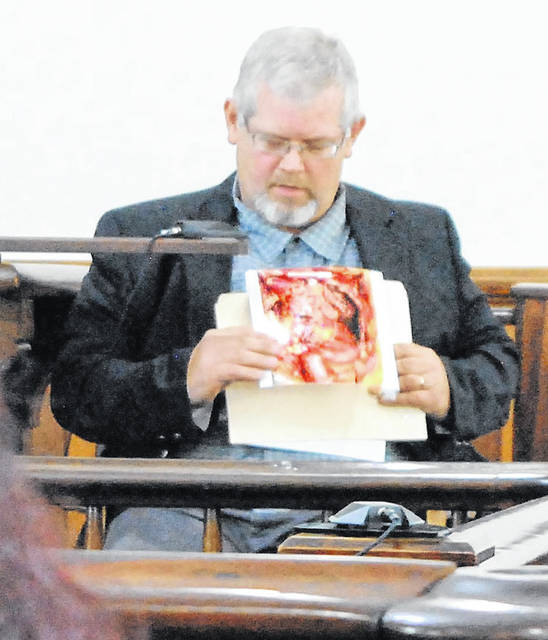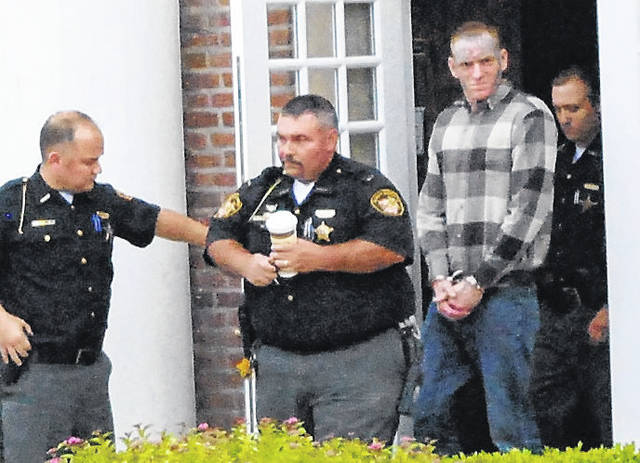

The murder trial of James Carver entered its second day Tuesday with testimony focusing on forensics, the autopsy report on victim Heather Camp, and Camp’s mother taking the witness stand near the end of proceedings in Highland County Common Pleas Court.
Witnesses for the prosecution included medical personnel who first examined Camp when she was brought to Greenfield Area Medical Center early on the morning of Feb. 19, 2019 to coroner’s investigators who conducted the probe into what caused her death.
Dr. Jill Eippert, emergency room physician at the Greenfield hospital, began prosecution witness testimony when court reconvened Tuesday, describing the medical equipment used and procedures employed to resuscitate Camp, a 33-year-old Wilmington woman who was brought to the hospital unresponsive from the backseat of a car driven by Robert Kinnison, who testified Monday.
“I observed deep, dark bruising around the eyes,” Eippert said, noting that early on she saw no sign of a gunshot wound, and that later examination using ultrasound showed a build-up of fluid in the abdomen, which she attributed to internal bleeding.
She confirmed she thought Camp had a faint pulse, with ultrasound indicating heart activity, and that she called police when she saw the facial injuries and extensive bruising.
Carver, 40, of New Vienna, allegedly beat Camp, shot her in the chest at close range on Feb. 17 in Highland, had sex with her as she was bleeding out, and refused to take her to the hospital.
Camp died nearly two days after she was shot, according to a bill of particulars filed by the Highland County Prosecutor’s Office. Carver was arrested three days after the alleged shooting.
The bill says Carver admitted to beating Camp, shooting her and having sex with her, although he maintained that the shooting was accidental as he was aiming the gun at Camp to intimidate her.
Carver is charged with murder, rape, having weapons under disability, domestic violence and tampering with evidence.
Hillsboro dentist Dr. James McKown, who also holds credentials as a coroner’s investigator, said he was briefed by Eippert upon his arrival later in the morning at the hospital, began taking forensic photos of Camp’s body, and told the jury Tuesday it was one of the worst cases of physical trauma he had seen.
Family members who were in the courtroom gallery showed shock and grief when photos of Camp’s body were shown to the court, with McKown answering questions from Highland County Prosecutor Anneka Collins about what the court was seeing.
One particular photo of the deceased’s face showed what McKown described as “blunt force trauma” to Camp’s upper left forehead, nasal bridge and lower right chin, in addition to severely blackened eyes, which he said came from blood pooling from the head and forehead into the eye sockets.
McKown told the court under cross examination by defense attorney John Cornely that in his opinion the “bruising occurred prior to death,” indicating that Camp had suffered a severe beating.
“A gunshot wound to the torso that led to internal bleeding” was how Dr. Brian Casto, a forensic pathologist for the Montgomery County Coroner’s office, described the cause of Camp’s death. He detailed in testimony that took nearly an 90 minutes the dynamics of autopsy procedures.
Casto’s testimony included additional graphic photos of Camp’s autopsy, showing the substantial bruising and trauma about her face and chest, and detailing the gunshot wound with powder burns. He said that indicated the gun used was less than an inch from her chest.
Casto said the ultimate cause of death came from being shot at close range, with the bullet hitting the diaphragm, liver, esophagus and grazing the thoracic aorta before stopping at the spine.
Internal bleeding would have been caused from the bullet transiting the organs, Casto said, adding that grazing the aorta would have been the primary cause for blood loss internally.
“It’s amazing that a knife or gunshot wound doesn’t bleed much externally,” Casto said, adding that in his autopsy he discovered over two liters of blood in Camp’s abdomen.He told the court that the human body has about 5.5 liters of blood and that almost half of Camp’s blood had bled out internally.
He said he was surprised that she survived two days after sustaining the gunshot wound, saying that in his opinion it was due to the fact the bullet grazed rather than punctured the aorta.
When cross examined by Cornely, Casto told the court that the toxicology report on Camp showed the presence of both methamphetamine and amphetamine in her blood, in addition to a prescription medication used to treat nerve pain.
Highland County Coroner Dr. Jeff Beery told the court he requested the autopsy on Camp. He said the time of death was around 3 a.m. Feb. 19, plus or minus three hours.
He said in his medical opinion, Camp’s body showed “evidence of a severe beating” and reaffirmed previous testimony that the circumstances of her death stemmed from a homicide “from a gunshot wound to the torso.”
Under cross examination, Beery said his office is called in when any death occurs and though natural causes are the most common, his decision as coroner is limited in scope to five circumstances of death: accidental, homicide, suicide, natural and means that can’t be determined.
Following brief testimony from FBI special agent Robert Buzzard detailing how the agency located Carver’s vehicle on East Third Street in Dayton and soon after apprehended him on Feb. 21, the final witness Tuesday was the victim’s mother, Mary Camp.
In often tearful testimony, Mary Camp shared that Carver and her daughter had been living together. She said she had known Carver since September or October of 2018, and that she had sent several text messages to Carver’s phone urging her daughter to surrender to authorities due to outstanding warrants.
Copies of the texts were admitted as evidence, with Mary Camp saying she texted to Carver’s phone that U.S. marshalls were searching for her daughter near the Wilmington Green apartment complex on Jodie Lane on the southern edge of Wilmington.
She said that Carver texted her on the afternoon of Feb. 18, responding that her daughter was fine. She told the court she found out the next day of her daughter’s death.
Judge Rocky Coss recessed the court until Wednesday morning. He said it was his opinion that witness testimony and the presentation of evidence would conclude at the close of the day Wednesday, with the jury getting the case Thursday.
Reach Tim Colliver at 937-402-2571.



